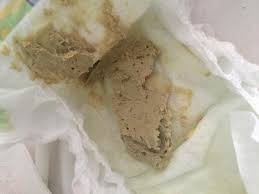
Green, brown and even yellow are okay for baby’s poops, but grey – even if the stools are only part grey and part green, means big trouble.
Even if poops appear as a mix of colors, if grey is one of those colors, such as “brownish-grey,” this means a visit to the doctor.
Make sure you are viewing your baby’s stools in good light to be sure about the color.
If you are absolutely positive that your baby’s poo can most accurately be described as greyish or even a “greenish grey,” waste no time taking the baby to a pediatrician to find out what the cause is.
“Pale, clay-colored, grey or grey green stools in an infant mean LIVER problem!” warns Jacqueline Winkelmann, MD, whose experience includes that of chief medical officer, pediatric hospitalist and former chief-of-staff, Orange County, CA.
Clay Color Defined
“‘Clay-colored stools’ is a classic medical textbook description for pale colored stools which might be associated with liver problems, particularly bile duct obstructions,” explains Dr. Winkelmann.

“Some medications, as I indicated, can also produce these types of stools. They are pale grayish in color.”
“An infant with grey green stools might be a cause for concern,” continues Dr. Winkelmann.
“Babies born with biliary atresia, a condition in which there is a blockage or absence of biliary ducts, the bile cannot reach the small intestine during digestion. Bile is what gives stool its brown color.”
There are other conditions that can cause a baby’s poops to come out grey or predominantly grey mixed with brown, tan or green.
Dr. Winkelmann says that liver disease such as hepatitis can be a cause. So can gallstones and liver tumors.
Liver Cancers in Babies?
“Rare in infants, but it is my understanding that yes, they do occur,” says Dr. Winkelmann. “This is from the website of one of the top children’s hospitals in the country, Children’s Hospital of Philadelphia (CHOP).
“Hepatoblastoma primarily affects children from infancy to about five years of age. Most cases appear during the first 18 months of life.
“It occurs more frequently in children who were born very prematurely (early) with very low birth weights.
“While I agree they are rare and would be unusual in the true ‘neonatal’ period (first 28 days of an infant’s life), hepatoblastomas occur most frequently in infants and children age two months to under five years.
“In contrast, hepatocellular carcinoma occurs most frequently in children age 10-16 years.
“About 100 children in the U.S. are diagnosed with hepatoblastoma each year.
“Together, hepatoblastoma and hepatocellular carcinoma account for less than 2% of cancers in children.”
Other Causes of Pale, Greyish Stools
“Medications used for diarrhea (like Pepto-Bismol) can give the stool a pale, greyish color,” says Dr. Winkelmann.
Another possible cause is “If a baby has had an X-ray procedure using barium (liquid baby’s drink before having an X-ray of the upper digestive tract).
“After the procedure, the baby will have several poops that are grey colored.”
If your baby has not undergone this procedure, it can’t be said enough: Get a doctor’s appointment as fast as possible.
A poop color that you can honestly describe with the word “grey” somewhere in there is simply NOT normal and requires a medical evaluation.
Does grey in a baby’s poop always mean something is wrong?
No, it is not a guarantee. It could be caused by what the baby is ingesting. Discuss this with your pediatrician.
But as long as serious diseases can also cause grey to appear in the poo, this fact qualifies your baby for a visit to the pediatrician to at least hopefully rule out anything serious. Why take a chance?
 Dr. Winkelmann, known as Dr. Jacq, has a special interest in sports nutrition for young athletes, teen issues and the opioid epidemic, and baby and infant product consulting. She’s an award-winning pediatrician, national and international speaker and published author.
Dr. Winkelmann, known as Dr. Jacq, has a special interest in sports nutrition for young athletes, teen issues and the opioid epidemic, and baby and infant product consulting. She’s an award-winning pediatrician, national and international speaker and published author.
 Lorra Garrick has been covering medical, fitness and cybersecurity topics for many years, having written thousands of articles for print magazines and websites, including as a ghostwriter. She’s also a former ACE-certified personal trainer.
Lorra Garrick has been covering medical, fitness and cybersecurity topics for many years, having written thousands of articles for print magazines and websites, including as a ghostwriter. She’s also a former ACE-certified personal trainer.

























